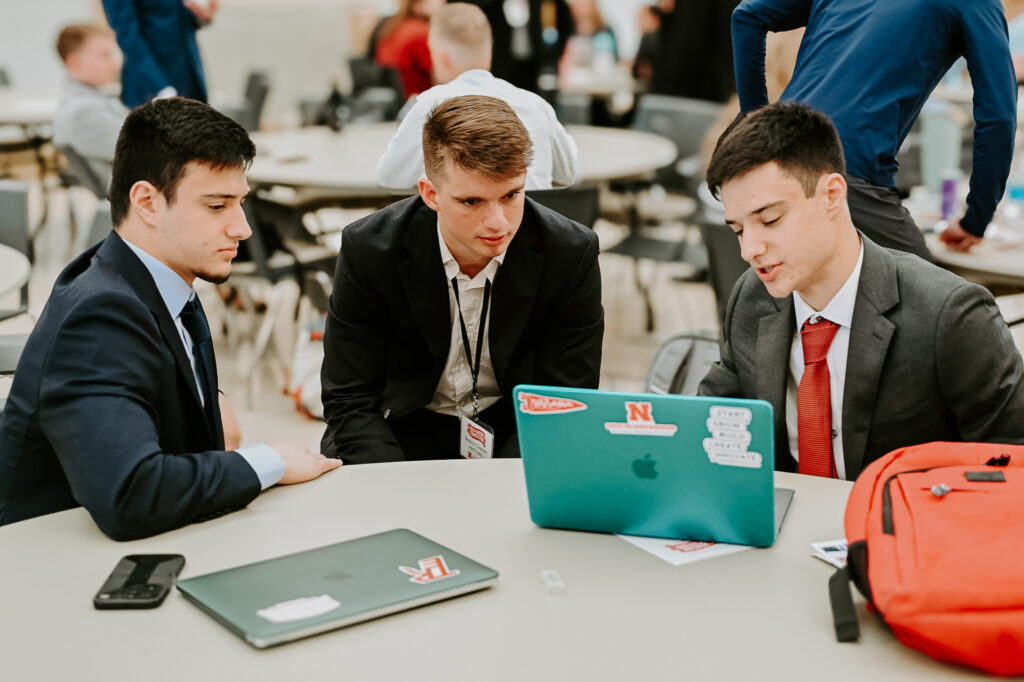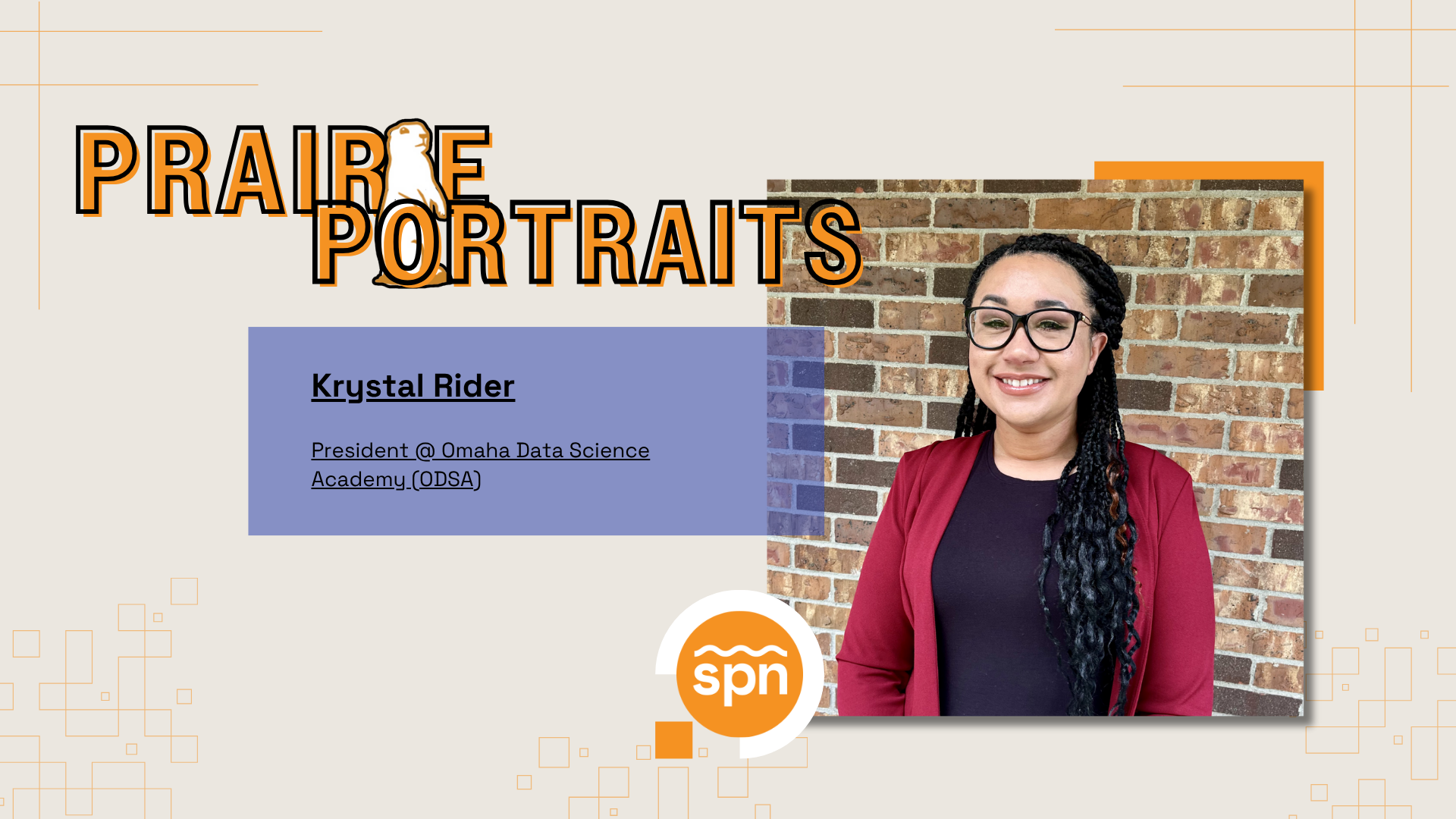When Alex and Ben Swidler first arrived at the University of Nebraska-Lincoln, their fantasy football hobby had already grown into a business. By the time they joined the Nebraska Entrepreneurship Accelerator, the brothers had staff, paying customers and a plan — but they were looking for something else: community and guidance.
They found it in the accelerator, which launched in 2024 and has quickly become a competitive program for student entrepreneurs at UNL. Today, both Alex and Ben continue to operate their business, The DFS Dojo, after graduation.
A program built for student founders
The Nebraska Entrepreneurship Accelerator began with 21 students in its first year, offering mentorship, peer groups, workshops, $1,000 scholarships and a practicum course for academic credit. The program was designed to support a growing number of students arriving at UNL with existing businesses or strong ideas they wanted to pursue.
“We realized, oh, we need one person to really dedicate a lot of time and energy to help these students,” said Lindsay Thomsen, the program director. “Some of them came to college with a business that has already been started. It’s off the ground, it’s producing revenue. And then others have this unbelievable idea that they really wanted to take further.”
Thomsen, a UNL graduate and entrepreneur who has owned four businesses, returned to campus about four years ago as a professor of practice at the Nebraska Center for Entrepreneurship. She now leads both the accelerator and the Entrepreneurship Catalysts program. Her focus is on helping students balance business growth and finishing their degrees.
“The true goal is to help the student stay in school, despite the fact that their business might be doing really well,” Thomsen said. “Let’s do both. Let’s have you graduate. So let’s support the scholastic component of it, but we want to support you to scale your business as well.”
Growing demand
This fall, 34 students are enrolled in the accelerator — 25 in their first year and nine returning for a second year of advanced programming. Out of more than 50 applicants, just 25 were selected for the new first-year cohort, marking the program’s shift to a competitive admission process.
To be admitted, students must either have an existing business or a strong idea they are committed to developing. Students are also expected to demonstrate leadership qualities and a willingness to contribute to peer groups, where feedback and collaboration are central.
Each participant receives a $1,000 scholarship ($500 per semester) and access to ENTR 424, a practicum course open only to accelerator members. The course offers three credit hours and is structured around business-building activities, peer group meetings and mentorship sessions — rather than traditional classroom work.
The program uses a cohort model: First-year students, known as A1s, receive foundational programming, while A2s continue for a second year of advanced work. Both groups are divided into peer teams with mentors from the business community. Workshops cover topics ranging from legal structures and marketing to hiring, financials and leadership.
“The requirements are that they have a business, or they have an idea that they really want to lean in to take it to the next iteration,” Thomsen said. “And then also, there’s a leadership component, because if you’re going to join a peer group, you have to be able to provide feedback and questions to other people to help them grow.”
Each student also receives an individualized development plan based on the book Traction. Students are assessed before and after the program to measure growth in areas such as customer identification, leadership mindset and financial skills.

Student experiences
For the Swidler brothers, the program provided both structure and inspiration. Their company, the DFS Dojo, grew from a high school fantasy football league into a subscription-based daily fantasy sports service.
“The accelerator, it’s not just for starting a business, it’s for starting a business and maximizing everything you do and becoming the best possible business owner you can be,” Alex said. “The mindset shift was very big for me, and that was probably the biggest takeaway from the mentorship.”
They credit their mentor, franchise and scaling expert Tom Welter with helping them think about growth.
“Talking to people like that … they almost always have an answer,” Ben said. “It was nice that we felt like we were talking with someone that had not only just done it all, but had a great knowledge base for all sides of the business that’s selling to customers.”
Ben added, “Being in that program gave us a bit of pride over what we have and what we did, because they value young entrepreneurs and what we’re doing so much.”
The practicum course and scholarship also made a difference. “Aside from the $1,000, it was more so the fact that the class was amazingly impactful,” Alex said. “We felt like it was one of the more useful classes that we took our entire time at school.”
Now out of school, the brothers continue running DFS Dojo while planning for future growth. They credit the accelerator for helping them take pride in their business and building the confidence to scale when the opportunity comes.
For 2025 graduate Madison Kreifels, the program came at a pivotal time. As she entered her senior year, Kreifels had already been operating her company, InfoFilm, for a year and a half.. She wanted it to be sustainable enough to support her after graduation — and it is. Just months after completing her degree, she’s working full-time on her film business.
“The generous scholarship that is given after being accepted into the program was very influential because it took a part of the financial burden of paying for tuition off my shoulders, allowing me to fully focus on business growth in my last semester of college,” Kreifels said.
She credits the mentorship, peer discussions and site visits to Nebraska businesses as influential. “Entrepreneurship isn’t a linear path, it is actually all over the board. There is no right or wrong answer, just whatever works for your industry and business.”
“The accelerator program helped me expand my network in the world of innovators and entrepreneurs,” Kreifels said. “It set me up for the best possible success after graduation.”
Following her participation in the accelerator program, Kreifels was awarded second place at the 2025 New Venture Competition.

Measuring success and looking forward
Since its launch, the accelerator has emphasized both quantitative and qualitative measures of success. Students take pre- and post-assessments to track growth in mindset, leadership and business fundamentals. Thomsen said having this data helps the program demonstrate its impact alongside student stories.
“Mindset is huge,” she said. “So one thing that we did when we started the program last August is I had them take a pre-assessment.” Thomsen hopes that in the future, they can publish the data showing the impact the accelerator has on students and the ecosystem.
In the immediate future, Thomsen hopes to expand the accelerator by adding more cohorts, increasing scholarship support and securing long-term funding. She also wants to deepen community engagement and eventually create opportunities for students to access seed funding.
“My big goal would be to fund this program so we can continue to bring in classes of 25, maybe even be able to increase that to 30 every single year,” Thomsen said. “And then eventually to fund some of these businesses. I think that would be the long-term goal.”
But Thomsen also emphasized that not every student needs to continue their business after the program. Success, she said, looks different for each entrepreneur.
“I don’t necessarily measure success as 100% of these students graduating and immediately scaling their business,” Thomsen said. “If some of them do that, I’m delighted. But I also support the student who decides to sell their business, or the one who says, ‘I learned a lot, but I’m going to wrap this up and try something else,’ because everything that that student learned makes them an unbelievable candidate for a business here in Nebraska.”
For now, the accelerator is helping more students — from those with big ideas to those already running revenue-generating companies — navigate the challenges of growing a business and completing a degree.
As Thomsen put it: “Let’s support you to scale your business, and let’s have you graduate.”






Leave a Reply